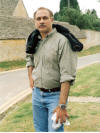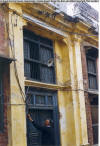|
|
the-south-asian.com July / August 2006 |
|
|||
|
August/September Contents
Sufis - wisdom against 50
years of mountain Heritage cities:
Cotton - the fibre of
|
|
||||
|
Gujranwala - its people and tradition of light industry by Salman Minhas
This is a story of how the manufacture of sanitary fittings [taps, showers, pipes] started, for the whole of the Indian sub-continent, in a small town called Gujranwala (now in Pakistan), way back in 1934. . Situated along the contours of the old Grand Trunk Road, Gujranwala is famous for its Sanitary Fittings and Sanitary ware and Electric Fans & Motors. Close by is the town of Sialkot which boasts of other famous small/light industries, namely Sports Goods, Surgical Goods [ Number 2 in the world after Germany] and Musical Instruments - all mostly for export [ especially Scottish bagpipes to Scotland , but also brass saxophones, bugles, drums, etc ] . It is also the story of amicable business working relationships between families that later had to move their businesses to a partitioned India in 1947.
Gujranwala - Early beginnings.[ 100 BC- AD 1800] Gujranwala is known mostly for being the birth place [ November 13, 1780] of Maharaja Ranjit Singh, the erstwhile ruler of Punjab. He was born in a Haveli in Gujranwala’s "Purani Mandi" or " Old Market [ his territory included Khyber to the Jumna and Kashmir to Multan. It is from the descendants of Ranjit Singh that the British later were to obtain, under fraudulent circumstances, the famous Kohinoor Diamond. which now is part of the Crown Jewels. [ see Khushwant Singh’s account of Ranjit Singh in his History of the Sikhs- Penguin Publishers; for another good account of this town see Salman Rashid : "Gujranwala – the glory that was"- Sang-e-Meel Publications] . Maharaja Ranjit Singh was the grandson of Charat Singh [ a Sansi Jat ] who raised fortifications around some Gujjar villages in 1756 and called it Gujraoli. Together with Mohammed Yar [ chief of Khiali – a village on the outskirts of Modern Gujranwala - the two joined hands after the death in 1707 of Aurangzeb and raised fortifications and thus laid the foundations of the old town of Gujranwala . These two fought against the invasions in 1738 of Afghan armies who under Nadir Shah Durrani and Ahmed Shah Abdali plundered Delhi. Gujranwala and Lahore [a major town on the Grand Trunk road] suffered doubly on the way to Delhi and again on the way back to Afghanistan] these invasions. Hence the perennial daring and happy go lucky nature of these Punjabi people. The Grand Trunk [GT road as it is now referred to] road [ Calcutta to Peshawar ] was built by the emperor Vikramaditya [ the king Arthur of Indian Legends] in 100 BC along with the roadside inns [ caravan serais] . The GT road was subsequently renovated by Sher Shah Suri after deposing Humayun, who following royal ancient tradition, built along side the road many a caravan serai [ caravan inns ] and baoli [ stepped stone lined water tanks ] . Its route followed what is now Wazirabad, passing though the village of Dhaunkal and through the small village of Eminabad, Wahndo and Kali Suba and onto Amritsar. Gujranwala – Modern Industry starts. [ 1934- Present ]
In 1934 two residents of Gujranwala, a certain Mr. Banarsi Shah and Charan Singh, set up a sanitary fittings factory near the Gujranwala Railway Station, near Civil Lines. This factory was to supply entire India with sanitary fittings. Although the houses of these families can still be seen in Gujranwala, the factory was pulled down a few months ago, the land which it occupied being about two acres in size and was next to the house of Mr. Charan Singh. The house of Banarsi Shah is still in good shape, being occupied. However the house of Mr Charan Singh is currently being used as the local passport office, is in a neglected state and lies next to the land of the now non-existent factory near the Gujranwala station. Mr. Rafiq Anwar and Mr. Mohammed Ramzan, [ two brothers ] who later on went on to build "Anwar Mechanical Works" and "Asia Fans" in Gujranwala, initially joined this factory in 1934 and worked there as employees. It was here that Mr. Anwar learnt the trade and manufacture of taps and pipes made from brass and Gun-Metal, both of which were available as scrap metal. Thus the techniques of polishing, chroming, electro-plating and sand casting became well established in this small town of Gujranwala. Business & Social Ethics in 1947 :
In 1943 , Mr. Anwar proceeded to form a partnership with a Mr. Ram Gopal Arora to manufacture sanitary fittings , in a factory called " Prabhat Engineering" in Gujranwala’s old city. In 1947 at the time of the partition, Mr. Ram Gopal Arora turned over the ownership of "Prabhat Engineering" to the name of Mr. Anwar. Mr. Anwar was to settle all accounts in an orderly manner so that eventual payment of the factory value was settled in a completely honorable manner. "Prabhat Engineering "was to be renamed as "Battala Foundry" under the ownership of a Mr. Mohammed Yakub, who was a Muslim refugee from India. During the days of the partition, two points need to be borne in mind. Mr. Anwar was a Muslim League supporter. Mr.Ram Gopal was a supporter of the Congress party. However political leanings were not to interfere in any way between the business relationship or the personal relationships between these two families. When political passions and civil unrest mounted in Gujranwala [ with a fair majority of Hindus and Sikhs – as you can still see their Temples and Gurdwaras] , Mr. Anwar carried out his duties towards the Gopal family in a befitting manner, providing food supplies and all moral support to them during the curfews, etc. Post 1947 - Visits to Pakistan by Ram Gopal’s family. In 1962 Mr. Khaled Anwar, the son of Mr. Anwar took up learning Hindi from a Bihari student, to facilitate communication between the two families. Initially the older generation, of Mr. Anwar and Mr. Gopal would correspond in Urdu script as Persian was the language known to all in the Punjab, so much so that even in the reign of Maharaja Ranjit Singh, Persian was the language of the court . During the Arora family visits to Pakistan in 1953 and later in 1990, the families would still exchange the tradition of "Rakhi" between the two daughters of Mr. Gopal Arora, Vini Devi and Venita Devi, and Mr. Anwar’s son. Their son Vijay Kumar Arora also kept in touch. Post -1947 Industries in Gujranwala. The foremen and supervisors from "Anwar Mechanical Works" were to start the process of expansion of the light Industries of Gujranwala. In 1973 Rana Nasir and Rana Faisal were to start a new manufacturing entity in sanitary fittings under the name of "Faisal". Likewise Mr. Mahmood and Maqbool, also from "Anwar Mechanical Works", expanded this industry by starting their venture called "Master". Faisal was later to give rise to "Magna" in 1980. In 1990 a new venture was also started under the name of "Sonex". Today if you are building a house, these are the names of taps and pipes and showers which one encounters in the shops in Pakistan. It was from these few industrious and ethical families of Charan Singh, Banarsi Shah and Rafiq Anwar that the modern industries of Gujranwala arose and have taken their place in modern day Pakistan’s industry. *****
|
|||||
|
Copyright © 2000 - 2006 [the-south-asian.com]. Intellectual Property. All rights reserved. |
|||||




